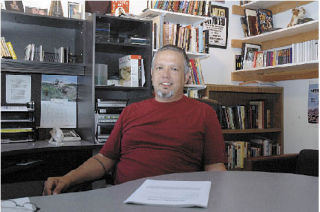MARYSVILLE — Back in March, Pastor Dan Hazen of the Allen Creek Community Church set out on a fairly ambitious mission. Essentially, Hazen wanted to try and determine the character of the area his church serves.
To accomplish his task, Hazen and the church sent out surveys and arranged interviews with community leaders ranging from the editorial board of The Marysville Globe and The Arlington Times to Mayor Dennis Kendall.
Sitting in his office recently, Hazen said the results of the study were equal parts confirmation of some instinctive thoughts as well as containing a few surprises.
One assumption revolves around what Hazen feels is a certain level of apathy among Marysville residents, as well as those in the surrounding communities of Arlington and Lake Stevens.
“It’s hard,” Hazen said, “to get people involved and committed.”
As one minor example, he pointed to the fact most Marysville City Council members and Kendall have run unopposed in recent elections. But in the same vein, Hazen admitted there are definitely small groups of committed individuals, for example, those who routinely support the local Rotary clubs or the Marysville Food Bank. But Hazen contends those organizations have small, regular groups of volunteers, with few newcomers. He also believes that in most cases, the volunteers tend to be older persons who have spent years working for the organization they support.
Another assumption Hazen believes was confirmed is that Marysville’s population remains fairly homogenous, largely consisting of whites of European ancestry. Hispanics seem to be the fastest growing single minority, along with Asians. But while Hazen said he saw no signs of racism, he also saw few signs of minority groups blending in with the local population. While he said that lack of blending might not be unique to Marysville, there may be a somewhat unique contributing factor.
Hazen noted that this area largely was settled by pioneers, people who valued their privacy.
“That desire for privacy, I think, is alive and well,” Hazen said.
There also is, he believes, a definite divide between persons who live and work in Marysville and those who live here but make a daily commute to somewhere else in order to earn a paycheck.
One surprise Hazen mentioned was his conclusion that Marysville, Arlington and Lake Stevens are not bedroom communities. Further, he described the areas as exurbs of Seattle, not suburbs. Suburbs usually take their general identity from the major urban area near which they are situated. On the other hand, exurbs usually have unique identities distinct from the nearest major metropolitan area. But while he described the areas as exurbs, Hazen said he isn’t sure Marysville or surrounding communities actually have developed an individualized sense of identity.
According to Hazen, one result of their exurb status is that this immediate area needs to further develop its local economy. Just as importantly to Hazen’s way of thinking, local communities need to create their own civic and cultural institutions. If that doesn’t happen, Hazen fears Marysville and surrounding areas could lose younger residents.
Hazen said he didn’t want to present himself as any sort of sociological authority and said his sampling methods were far from scientific. He also said he still needs to compile results from surveys answered by Allen Creek Church members.
So what does Hazen plan to do with the results of his survey? He said that answer is largely up to Allen Creek’s elders.
“Are we being called to exert some leadership role?” he said. “I don’t know.”
The complete results of Allen Creeks’ survey can be found on-line at www.ac3.org.



